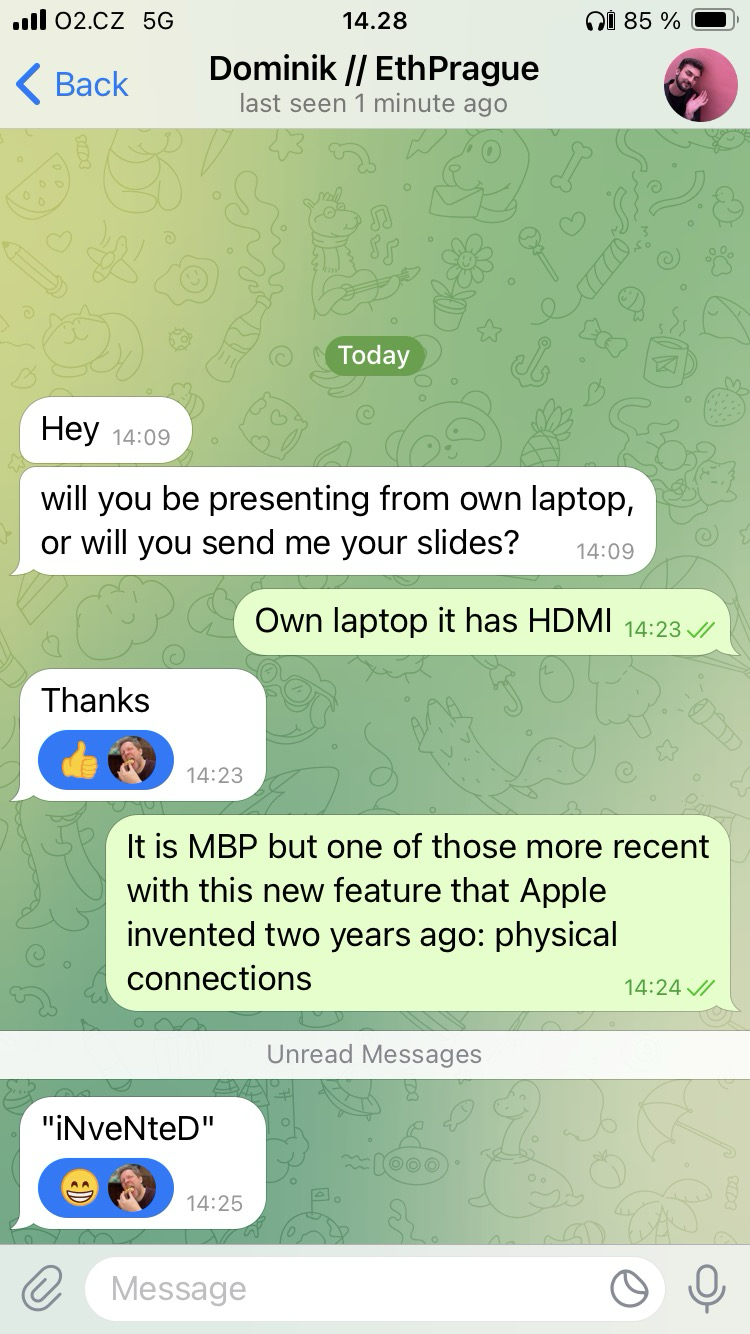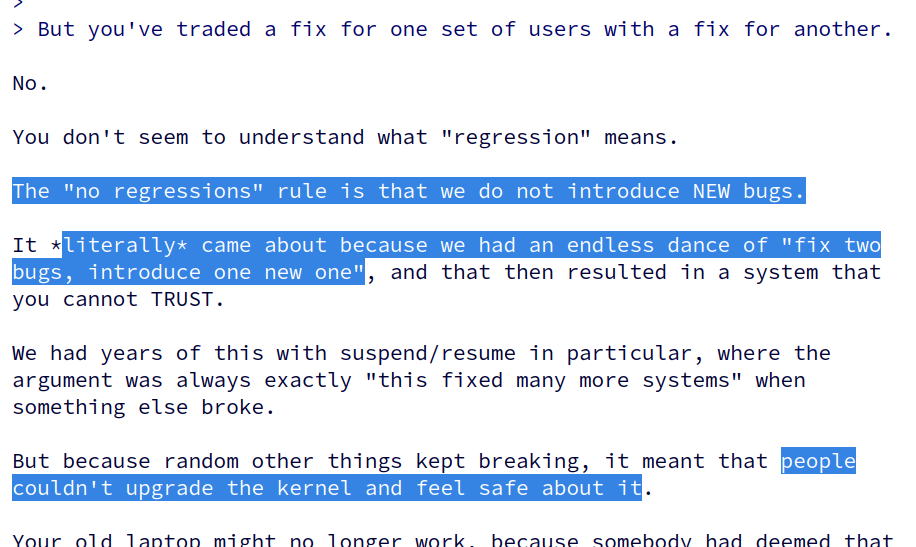Posts
5046Following
330Followers
504OpenPGP: 3AB05486C7752FE1
Jarkko Sakkinen
jarkkoJarkko Sakkinen
jarkkoAlso, here the cool part considering is really the ASN.1 compiler, which could take advantage of procedural macros to spit out snippet of that bytecode. Because it is part of kbuild shenanigans it could be enabled potentially earlier than actual Rust features in vmlinux.
Doing this might also be a way to find better guidelines on how to use Rust in kernel.
#linux #kernel #Rust #rustlang
Jarkko Sakkinen
jarkkoThen gccrs would need to be on par only on that subset to be enabled for kernel build, which is first and foremost important thing for defconfig.
I implemented first versions of WebGL support back in 2010 for QtWebKit, which then spread to GtkWebKit and EFLWebKit. From that background I know how nicely that project copes with C++ and its crazy features :-)
Jon Greig
jgreig@ioc.exchangeNIST said it has awarded a new contract to an outside vendor that will help the federal government process software and hardware bugs added to the National Vulnerability Database (NVD).
NIST wouldnt say which vendor was hired
https://therecord.media/nist-nvd-backlog-clear-end-fiscal-2024
Jarkko Sakkinen
jarkkoLWN.net is now @LWN@lwn.net
LWN@fosstodon.orgA plea for more thoughtful comments https://lwn.net/Articles/975597/ #LWN
AndresFreundTec
AndresFreundTec@mastodon.socialHere are the slides for a talk I just gave about using perf c2c to find cache line contention in postgres:
https://anarazel.de/talks/2024-05-29-pgconf-dev-c2c/postgres-perf-c2c.pdf
Jarkko Sakkinen
jarkkoI think there would be still space for systems programming language with a constraint from day zero that it would 1:1 compatible with plain C”s binary layout and memory model:
- Roughly just
.text,.bss,.rodataand,data. - No symbol mangling at all.
All the memory safety etc. fancy features would be then designed within exactly those constraints.
#Rust is essentially a derivative of C++ when compiled to binary, which does not really make it a strong competitor for plain #C. It can substitute C in many cases for sure, just like C++ did, but there’s always need for minimal systems programming language, which also looks elegant in binary, not just in source code.
A compiled C program can be quite easily understood with a binary with no debug symbols at all if you understand the CPU architecture well enough. That is, and will be a strong asset for C.
Jarkko Sakkinen
jarkkoMy game plan for the next weekends Ethprague is this:
- Introduce roles in authentication: user and machine both I think should be represented with their own private keys. I.e. consider ENS as a fancy LDAP that the machine can access.
- Represent asymmetric TPM2 keys (
tpm2_key_rsa,tpm2_key_ecdsa) as a way to give a guarded identity for the machine (or node). - The lack of
TPM_ECC_P256_K1in TCG Algorithm Repository means that TPM’s cannot natively store Ethereum private keys. Could and should change tho. - Workaround that I’m going to do after my first patch set is completed: software ECDSA for p256k1, i.e. signing and verification. Allows to root the keychain to an asymmetric TPM2 key.
Feels like 25-30 mins to me. Most importantly, not much knowledge required of #Ethereum, which is pretty alien topic to me :-) About to head soon to the #Tampere airport.
I’m not really even a fan of blockchains or cryptocurrency but I still think that it is good to provide safe and usable mechanisms for any legit task that user wants to use Linux for. So thus I want to enable those and free of charge, in order to keep my position regarding this topic (no affiliations). I only benefit flights to Prague from this work (pay for Airbnb myself).
CONFIG.SYS: LOADHIGH
loadhigh@bitbang.socialI completely forgot I uploaded VistaPro 3.20 (the scenery renderer) to the Internet Archive, where you can run it from your browser. For those sudden urges of wanting to create some landscapes.
https://archive.org/details/vistapro320
Includes the MakePath tool.
Don't forget to take screenshots of your creations! Nothing can be retrieved from the disk the in-browser DOSBox keeps, as far as I know.
(Please be patient with the Archive's speed, they're dealing with persistent DDoS attacks at the moment)
Jarkko Sakkinen
jarkkoWhile developing asymmetric TPM2 keys, and reviewing TPM bus encryption earlier, I came to realize that both tpm2-tools and ibmtss feel unintuitive.
So I started to seek, if some had ever backed up my old tpm2-scripts, from which kselftest was inherited. I did not have anymore any repo for that one.
With Google I luckily found a backup from the Github profile of @colinianking, so thank you for that. Then I just copied over latest version of just tpm2.py (GPL/BSD dual-licensed file).
Probably will have some incompatibility issues with old scripts and updated main module (less than 10 updates in its total life-time tho) but I will fix them as soon as I need to test anything.
Anyway, a new and to-be-lean TPM2 hacking tool has been initiated: tpm2ctl (there’s no even file of that name yet but definitely will be at some point ;-)).
lwnbot
lwnbot@c.imA plea for more thoughtful comments https://lwn.net/Articles/975597/ #tech #linux
Thorsten Leemhuis (acct. 1/4)
kernellogger@fosstodon.orgEver wondered why @torvalds coined the #Linux #kernel's "no regressions" rule? He just explained it again here: https://lore.kernel.org/all/CAHk-=wgtb7y-bEh7tPDvDWru7ZKQ8-KMjZ53Tsk37zsPPdwXbA@mail.gmail.com/
'"[…] I introduced that "no regressions" rule something like two decades ago, because people need to be able to update their kernel without fear of something they relied on suddenly stopping to work. […]"'
Follow the link for context and other statements that did not fit into a toot.
Jarkko Sakkinen
jarkkoEmailed to TCG:
Forwarded message from Trusted Computing Group on Wed May 29, 2024 at 1:58 PM:
Message Body:
Some views on topic I've written:
- https://social.kernel.org/notice/AiNuw35YY9uOSrhiK0
- https://github.com/wolfSSL/wolfTPM/issues/356
Linux kernel patch set ongoing which made me realize that p256k1 is lacking from your registry:
- https://lore.kernel.org/linux-integrity/20240528210823.28798-1-jarkko@kernel.org/
This really should exist despite not being the most secure ECC given the compatibility to a number o
f open source projects and platforms (not just ETH and BTC). Please read also the above links, the w
rite ups are short and to the point. This would add by factors the importance of TPM2 ecosystem spre
ading to new applications.
--
This e-mail was sent from a contact form on Trusted Computing Group (https://trustedcomputinggroup.o
rg)
On possibility of adding TPM_ECC_SECP_P256_K1 curve to https://trustedcomputinggroup.org/wp-content/uploads/TCG-Algorithm-Registry-Revision-1.34_pub-1.pdf
Jarkko Sakkinen
jarkkoI think after TPM2 RSA/ECDSA work lands to mainline, I'll make software implementation of p256k1 ECDSA verification, and some time later, signing. That way at least TPM2 keys can root a key hierarchy for p256k1 keys to the Linux keyring, despite being just software implementation.
Stefan Berger has done during last 2-3 years a decent ecc_* API so should not be even a huge stretch.
So tpm2_key_ecdsa (if I did not overlook anything, cannot be 100% sure) might even enable ECDSA signing overall for Linux kernel for the first time.
#linux #kernel #keys #keyring
Jarkko Sakkinen
jarkkohttps://trustedcomputinggroup.org/resource/tcg-algorithm-registry/
#TPM #blockchain
Jarkko Sakkinen
jarkkoThis is the first version with fully working #ECDSA signing and signature verification with the public key.
Implementation notes:
- Accepts only sha256 at this point. Can be easily extended later. It is best overall choice for the first version.
- Does not accept any authentication policy yet. Can be extended later by adding a new parameter to
match_table_t param_keysinsecurity/keys/keyctl_pkey.c. E.g."policy=%s".
I’m pretty happy with this, given that I did it fully during 1.5 week period on my free time and unpaid ;-)

